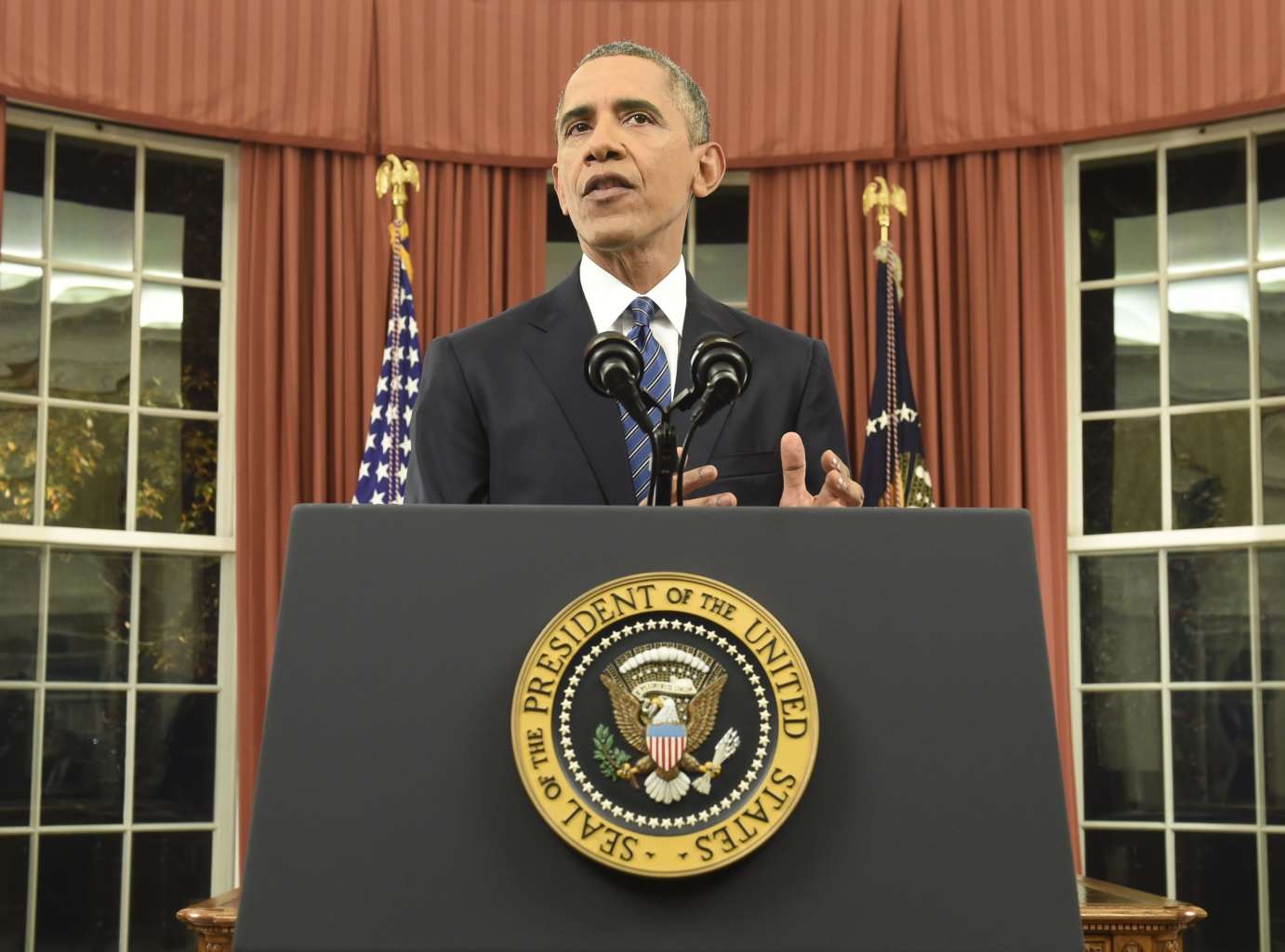US President Barack Obama's Oval Office address: 5 significant Oval Office speeches
Sign up now: Get ST's newsletters delivered to your inbox

US President Barack Obama speaking during an address to the nation from the Oval Office of the White House on Dec 6, 2015.
PHOTO: AFP
President Barack Obama's Oval Office address on Sunday was only his third since he was elected in 2008.
The rare broadcast from the United States President's seat of power sought to assure Americans that the US government has been acting against the threat of terrorist group Islamic State in Iraq and Syria (ISIS) in the wake of the San Bernadino attacks.
The rampage in California by married couple, US-born Syed Farook and his Pakistani wife Tashfeen Malik, killed 14 people at an office party.
This is the first successful ISIS-inspired attack in the US.
Mr Obama's last two Oval Office addresses were in 2010. One concerned the BP oil spill in the Gulf of Mexico and the other was to formally end the combat mission in Iraq.
Before him, other presidents have used the occasion more liberally, with predecessor George W. Bush giving six addresses, and Ronald Reagan, who was president from 1981 to 1989, a total of 34.
Here are five significant oval office addresses in history:
1. George W. Bush on September 11 attacks in 2001
Delivered on the evening of the September 11, 2001 attacks in New York, President Bush condemned the attacks while rallying the nation.
This was his first Oval Office address and one of his most memorable speeches.
"The pictures of airplanes flying into buildings, fires burning, huge structures collapsing have filled us with disbelief, terrible sadness, and a quiet, unyielding anger. These acts of mass murder were intended to frighten our nation into chaos and retreat, but they have failed. Our country is strong."
2. Ronald Reagan on the Space Shuttle Challenger explosion in 1986
The Republican president replaced his state of the Union address with a speech addressing the tragic accident which killed seven astronauts.
Mr Reagan was also one of the presidents who used the Oval Office address the most. With television dominating the mass media landscape in the 80s, he drew tens of millions of viewers.
"The crew of the space shuttle Challenger honoured us by the manner in which they lived their lives. We will never forget them, nor the last time we saw them, this morning, as they prepared for their journey and waved goodbye and 'slipped the surly bonds of earth' to 'touch the face of God'."
3. Richard Nixon announcing his resignation in 1974
Mr Nixon was the first president in US history to resign, as he caved to public and political pressure after the Watergate scandal.
He was succeeded by Vice-President Gerald Ford the day after the address, who completed the remaining 21/2 years in office for the embattled former president.
"Throughout the long and difficult period of Watergate, I have felt it was my duty to persevere, to make every possible effort to complete the term of office to which you elected me.
"In the past few days, however, it has become evident to me that I no longer have a strong enough political base in the Congress to justify continuing that effort."
4. John F.Kennedy on the Cuban Missile Crisis in 1962
Thirteen days in October 1962 were probably the closest the world has come to a nuclear war.
It was sparked when the US discovered that the Soviet Union had decided to surreptitiously introduce missiles into Cuba.
President Kennedy informed Americans of presence of the missiles and the actions the government would be taking.
"This sudden, clandestine decision to station strategic weapons for the first time outside of Soviet soil - is a deliberately provocative and unjustified change in the status quo which cannot be accepted by this country, if our courage and our commitments are ever to be trusted again by either friend or foe."
5. Harry S. Truman on food conservation in 1947
President Truman gave the first televised address from the presidential office two years after the conclusion of World War II.
He urged Americans to conserve food to aid postwar Europe - with "meatless Tuesdays", and to forgo eggs and poultry on Thursdays.
His audience was small as there were only about 44,000 TV sets in US homes then.
"The battle to save food in the United States is the battle to save our own prosperity and to save the free countries of Western Europe.
"Our self-denial will serve us well in the years to come."
Sources: BBC, New York Times, Washington Post, Voice of America


